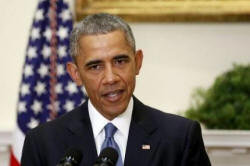|
 In
new hostage policy, U.S. will not prosecute families for paying ransom In
new hostage policy, U.S. will not prosecute families for paying ransom
 Send a link to a friend
Send a link to a friend
[June 25, 2015]
WASHINGTON (Reuters) - The White
House on Wednesday released a new policy aimed at becoming more
sensitive to the needs of families of U.S. hostages held abroad, saying
the government needed to "evolve" to take account of a shift in the way
groups take captives.
|
|
 After a six-month review that included discussions with families
of people held overseas, the White House said the government will
continue its longstanding policy of not making concessions to
hostage-takers. After a six-month review that included discussions with families
of people held overseas, the White House said the government will
continue its longstanding policy of not making concessions to
hostage-takers.
But it will no longer threaten families who decide to pay ransoms.
The government may communicate with hostage-takers and
intermediaries, and it may help families who are trying to pay
ransom, the White House said.
The new directive from President Barack Obama "reaffirms the 'no
concessions' policy, but makes clear for the first time that 'no
concessions' does not mean 'no communication,'" the White House said
in a statement.
The White House said it has also created an interagency group called
a "fusion cell" to work on hostage recovery issues and better
communicate with families.
A new presidential envoy for hostage affairs will coordinate
diplomatic work with foreign governments, the White House said.
[to top of second column] |

Obama was slated to speak about the new policy in a televised
statement on Wednesday.
(Reporting by Roberta Rampton and Alina Selyukh; Editing by Emily
Stephenson)
[© 2015 Thomson Reuters. All rights
reserved.]
Copyright 2015 Reuters. All rights reserved. This material may not be published,
broadcast, rewritten or redistributed.
 |